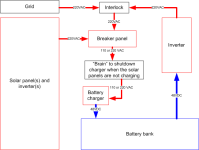It depends on the length of the outage. In our case, knock on wood, the longest the outage has been 10-12 hours over night. Usually it is four hours or so. While these are not long outages, it is a bit of the PITA. It would be nice to have a few batteries to run a few essentials until power is restored but the cost to do this with PV is high and almost certainly does not make money sense.
When we lived in the city we were lucky in that our power came right off a main distribution line so even in a power outage the longest we were without power was 8-12 hours. Subdivisions next door were out for almost a week because their power was from a different direction. Where we are now, people were without power for about a week after Fran. Our outages are wind storms, ice storms and hurricanes. All three blow through very quickly and we have sunshine back quickly. While a generator would still be needed in a long outage having PV doing most of the work, especially if it is on the roof, would be more than helpful. The fact that one cannot use the PV in an outage without expensive batteries is a big negative.
I think you are too hung up on night time. We do not plan to run the generator 24 hours nor would we want too. No way we could afford to run that long. Even running an hour or so every 3-4 hours gets expensive after a few days. We would just want to power the fridge, freezer, and well a few times during the day. The well not as much since we can store water. Even if the PV only provided power for the five hours a day, it would be the critical hours when we would be accessing the fridge for food, and the PV could keep it cool. Generator usage/expense would be much reduced.
Because PV CANNOT do this at low cost, one of the guys in class is most unhappy, since this is exactly what he wants to do.
Later,
Dan
